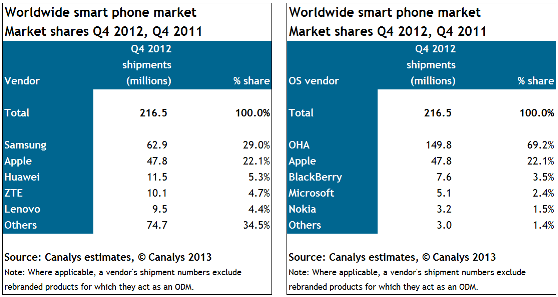Canalys just published its final mobile phone shipment estimates, which show that although Samsung is still on top of the global smart phone market, three Chinese manufacturers-Huawei, ZTE and Lenovo-all climbed into the top five for the first time, thanks to domestic success as well as sales in overseas markets.
Huawei took third place, which isn't a surprise if you recollect IDC's Q4 report on the global mobile phone market, which revealed last month that it sprang up into the top-three smartphone vendors in the world, a first for the company. ZTE slid into fourth place for the first time in Q4 2012, thanks to success in their home markets as well as sales in the U.S., where ZTE was fourth and Huawei fifth thanks to their product lineups of low-cost LTE smartphones.
Though their market share is climbing in the U.S., ZTE and Huawei combined still took up less than 5 percent of the market share in an arena still dominated by Samsung and Apple.
Sony fared less well, slipping out of the top five in Q4 as Lenovo, one of the fastest-growing smartphone vendors, moved in. Lenovo grew 216% year-on-year, moving 9.5 million units to take fifth place-but the Chinese manufacturer is still struggling to break into overseas markets, which means it may have to seek other avenues for growth. Last month, Lenovo downplayed reports that it is looking at BlackBerry as a potential acquisition, but said it's taking a close look at other M&A opportunities.
"China made up 98% of Lenovo's shipments with a handful of emerging markets making up the rest. Its struggle to gain a foothold in markets outside of China means that it may be forced down the acquisition route–as it was with its PC business-hence the speculation about BlackBerry," said Jessica Kwee, a Canalys analyst.
Canalys tracked mobile phone shipments estimates across more than 50 countries. The total mobile phone market, at 438.1 million units, was flat year-on-year, while the worldwide smart phone market grew 37%. Smartphones made up almost half of the all phones shipped in the fourth quarter. Of the latter number, Android smart phones powered 34% of total phone shipments, while 11% were iPhones.
In the smart phone market alone, Android handsets made up 69% of the 216.5 million shipped. Its market share fell slightly from 74% as Apple's share grew from 15% to 22%, thanks to the iPhone 5. In terms of Android manufacturers, Samsung grew by 78%, while Chinese vendors Huawei, ZTE, Lenovo and Yulong all surged by triple-digit percentages. BlackBerry and Windows Phone shares remained unchanged at 4% and 2%.
"BlackBerry, Microsoft and Nokia, as well as other Android vendors, have strategies and devices in place to attack, but the task is daunting to say the least," said Pete Cunningham, Canalys principal analyst. "When we look at the whole of 2012, Nokia remained the number three smart phone vendor, shipping 35 million units, but Apple in second place shipped 101 million more handsets. First-placed Samsung shipped 74 million more than Apple-the gaps are colossal. But there is still a big opportunity as smart phone penetration increases around the world."
China, the largest phone market in the world, was unsurprisingly a key element in each of these manufacturers' growth stories. Smart phones dominated shipments in that country, making up 73% of the market, an increase from 40% a year ago. (This makes China unique among other emerging economies like Brazil, Russia and India, where feature phones still dominate, according to recent research by Nielsen). Volumes of smart phones there grew 113% to 64.7 million units. Samsung was the top seller, followed by Lenovo and Yulong. Huawei beat ZTE by over a million units for fourth place. Apple's market share, however, failed to see significant growth.
"China is a massive growth prospect, but Apple is not making the market share impact there that it is in other markets. The lack of a device on the China Mobile network is a big drawback, combined with high price points. Addressing these issues with the combination of a TD-SCDMA device and a cheaper model would open the flood-gates," said Nicole Peng, China research director.

No hay comentarios:
Publicar un comentario